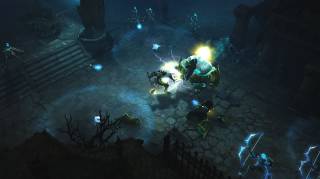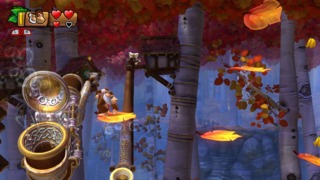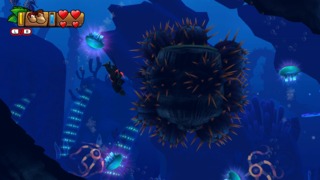Monthly Roundup, April 2014
By majormitch 7 Comments
April was somehow simultaneously a very slow and a very busy month for me. On the one hand, not a lot of new gaming releases meant I had time to breath and catch up a little. On the other hand, I left my job at the end of April (to go back to school) and spent a lot of the month planning for and making a big move. That made for a lot of logistics that took up a fair amount of time, but I did manage to squeeze some gaming in as always. In addition to what I talk about below I also played some Luftrausers, which I think is a pretty fun arcade shooter with a good progression of weapon unlocks and challenges if you want more specific goals than chasing high scores (as I do). I don’t have much more to say on that, however, so let’s move on to the trio of games I have more substantial thoughts on.
Diablo III: Reaper of Souls
Diablo III has had a weird life. When I played it upon its initial release, I immediately liked it more than any other game I had played of that style, previous Diablos included. That was primarily due to the game’s snappy, fun combat, and the robust skills system that you could experiment with on the fly. It made for a game that I could enjoy for the moment to moment gameplay, rather than rely solely on Skinnerian random loot drops for satisfaction (which rarely work on me). Yet Diablo III did have its issues here and there, and many longtime series fans had even more ingrained complaints with the game’s core design, to which Blizzard clearly listened. This led to regular patches and updates that have culminated in the release of Reaper of Souls, all of which combine to change the game in some pretty drastic ways.

I haven’t touched Diablo III in any form for roughly a year and a half, so I’m not 100% sure what was changed in patches, and what is specific to Reaper of Souls; it all runs together for me. Regardless, Diablo III today is a drastically different beast from when it first came out nearly two years ago. Fortunately, the core aspects that I liked right out of the gate remain largely unchanged, meaning the combat and skills remain extremely fun to engage with. But most everything else around the periphery has gotten an overhaul to varying degrees, and in my opinion almost all for the better. Among the bigger changes is that the auction house is now gone and replaced with “Loot 2.0”, which essentially means that you find much better loot all the time. After finding a single legendary item in roughly 100 hours of play before, I now seem to find at least one every hour or two, and rare (yellow) items drop in abundance. It’s made the game a lot more about loot, which is probably for the better in the big picture, even if I’m kind of indifferent to it. The other big change to me is the new difficulty structure: no longer are there four sequential difficulties with set enemy levels. Instead, enemies automatically scale to your level, and you can change the difficulty independently at any time. Higher difficulties yield tougher monsters and higher rewards, and it’s now very possible to hit the level cap in a single playthrough of the game. This difficulty restructuring is easily my favorite change, as it was previously a pain to grind through the overly easy normal and nightmare difficulties just to get to an interesting challenge. Now you can set your level of challenge as low or as high as you want right out of the gate, and get rewarded for going big if you so choose. It also makes leveling much faster, thus making the game much less of a grind.
I feel like those are the two most meaningful changes, but there’s plenty more ranging from minor interface and/or balance tweaks to smart content additions. The crafters have been adjusted to feel more meaningful (including the new crafter), many skills have been rebalanced or changed altogether, the level cap has been raised to 70, and you can now in theory gain infinite paragon levels (a programming impossibility, but I get what they mean). Then you have a new character class, a new act and the new adventure mode. The new act and class are essentially more of the same, which is all good if nothing drastic. Adventure mode seems like the real key addition, however, which gives players ways to take on random challenges and dungeons indefinitely in search of better and better loot. I think it’s a really neat mode that adds a viable endgame to Diablo III, even if my case of “loot lust” has never been dire enough to need such an option. All of these changes culminate to make the game feel much more refined and complete, and I think the result is a higher quality product. Ironically, I think I might have had more fun with vanilla Diablo III, but I also know that’s purely because it was new. The things I liked about Diablo III originally are the things that have changed the least, and it’s no surprise that some of the novelty has worn off. At any rate, as of Reaper of Souls I do think Diablo III is a noticeably better game than ever, and I’m pretty impressed by Blizzard's ability and devotion to keep updating and improving what was already a really solid game.
Donkey Kong Country: Tropical Freeze

I’ve really liked the Donkey Kong Country series ever since the wonderful original trilogy on the SNES, and have always felt the series harbors a unique position among Nintendo’s large stable of platformers. Compared to the likes of Mario, Yoshi, Kirby and so on, the DKC series has consistently been the toughest Nintendo platforming series. Furthermore, at least compared to the ever prominent Mario, DKC is more of a timing based platformer rather than an action or twitch based one. The big ape has a certain momentum to him that makes you really commit to and respect your movements, which lends it a more unique, methodical feel. I like that difference in feel, not only because I think DKC’s controls feels extremely comfortable in their own way, but it’s nice to see that different styles of platformers can coexist. I also appreciate games that take the time to stop and smell the roses, which is something DKC has done quite well. A lot of platformers are incredibly fast-paced and action oriented, but DKC’s more measured nature makes it easier to enjoy the sights and sounds of your adventure. Lush visuals and vibrant music have long been staples of the series, and that level of production is a wonderful complement to the series’ tough, timing based platforming.

I’ve always appreciated DKC’s unique blend of challenge, feel and production, and Tropical Freeze replicates those traits skillfully. The controls feel spot on, and are finely tuned to the style of platformer on offer. And thankfully, unlike Donkey Kong Country Returns, there are no motion controls in sight; everything’s carried out via good old fashioned buttons, d-pads and thumbsticks. In spite of that I think the challenge level is about on par with Returns, which is not as hard as a lot of reviews make it out to be, and not nearly as hard as the original SNES trilogy, but it still offers a stiff test by today’s standards (especially if you chase all the collectibles). A lot of other elements are comparable to Returns as well, though there are some subtle differences that make Tropical Freeze stand on its own. Most immediately obvious are the visuals and soundtrack. Thanks to the Wii U’s hardware superiority over the Wii, and David Wise’s return as composer, Topical Freeze looks and sounds noticeably better than Returns (which didn’t look or sound bad by any means). This is a gorgeous game, with lots of detailed environments, and the style and tone of the musical score match every level to a tee. 2014 will be hard pressed to cough up many soundtracks better than this, and it’s hard to overstate how important music is to the feel of a DKC game. In that department, Tropical Freeze is as good as any in the series.
In addition, while the individual level design is also on par with what I remember from Returns, Tropical Freeze feels like a more assuredly assembled game in the larger picture. Despite a somewhat slow start (a staple of all modern Nintendo platformers), the progression of levels feels smoother and more consistent in terms of both difficulty and design, and the mechanical elements mesh with the visuals and music more naturally. It’s kind of hard to describe, but where Returns felt like it was banking heavily on the nostalgia of the SNES games, Tropical Freeze feels more like its own game that’s nevertheless built in a very similar mold. Despite the two games being more similar than they are different, that feeling, along with the lack of motion controls and the enhanced audiovisual presentation, has me liking Tropical Freeze more than I liked Returns (which I did like quite a bit). The two newer DKC games still fall shy of the SNES classics on the whole, but they manage to capture most of the spirit of those games while being good platformers on their own. This is especially true of Tropical Freeze, which I had a lot of fun with, and I think anyone partial to a good 2D platformer would enjoy it too.
Beyond: Two Souls

I was among those who enjoyed Heavy Rain quite a bit, warts and all, which left me super curious to see what Quantic Dream’s follow-up game would be like. The result, Beyond: Two Souls, is just as much a mixed bag as its predecessor, but it’s also one I appreciate markedly less. That may seem a little odd at first, but while the two games employ many similar techniques, and it’s easy to look at them as being very much in the same lineage, I find them to be very different experiences in practice. Heavy Rain was surprisingly interactive, and told a story that could change in subtle but substantial ways based on the composition of your actions and choices throughout the game. Characters could live or die, and large plot threads could go unresolved depending on how you chose to play, which felt fairly progressive in regards to video game stories at the time. Beyond, while similar on the surface, not only offers fewer meaningful choices, but also doesn’t incorporate them in any meaningful ways. The repercussions of the handful of choices you do make are confined to the particular chapter you’re in, and even then they don’t have any impact on where that chapter ends up. Once you jump to the next chapter it all gets left behind, with even the game’s multiple endings resulting solely from a few contrived last minute decisions. This is a much more linear and authored story than Heavy Rain; this is Jodie Holmes’ story through and through, and it’s going to follow the same beats for everyone who witnesses it.
From a pure story standpoint that authorship could be totally fine, but it defines the entire play experience just as thoroughly. It comes across most egregiously in the way you interact via Aiden, an ethereal spirit and the second playable “soul” the title refers to. In theory, at any point you can switch to Aiden and interact with objects or people in the environment. And yet, this central mechanic is almost fully scripted. You’re only allowed to switch and interact with objects as dictated by the story, which feels very arbitrary to the extent that it’s virtually pointless to even be designated a participant in the first place. For example, during the chapters where you fight enemy soldiers, you can choke some soldiers, you can take control of some soldiers, and others you can’t do anything to at all. Each soldier has a specific action or inaction assigned to them, which more or less turns it into a poor “color by number” exercise. This not only makes no sense fictionally, but it’s a frustrating denial of player interaction that makes me think Beyond might be the rare video game I would enjoy more as a movie. That’s a regressive quality that I tend to consider a pejorative, and I wouldn’t say the same about Heavy Rain. The ironic part is that I probably like Beyond’s story better than Heavy Rain’s (especially given Beyond’s top notch acting performances), but when it comes to the actual play experience, Beyond doesn’t do much for me as a video game, which is a shame.
Looking Ahead to May
Now that I’ve made my move, and have a few weeks off before school ramps up in earnest, I have high hopes that I can do some real damage to some games in May. I’ve already started playing Skyrim’s Dragonborn DLC, and plan to tackle BioShock Infinite’s Burial at Sea DLC after that. Infamous: Second Son remains a top candidate as well, and I have a few other backlog items in mind that I hope to get to if there’s time. As for new May releases, I’m really excited for Transistor; I love what those guys do, and will almost certainly play that as soon as I can. Watch Dogs and Mario Kart 8 are the other two May releases I have my eye on, both of which I’m skeptical but hopeful for. That’s the outlook on May, let the games begin!
